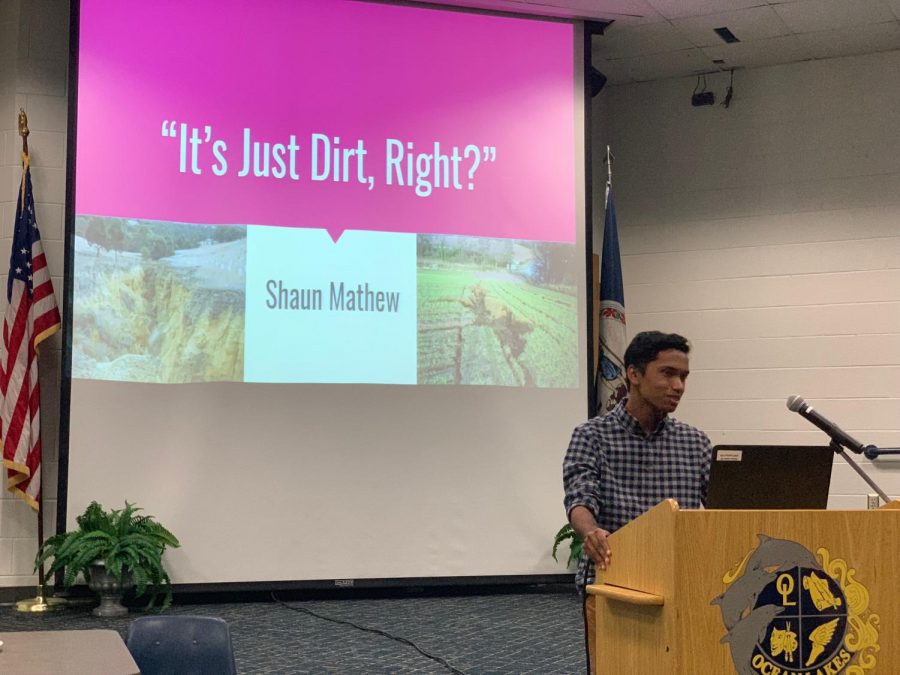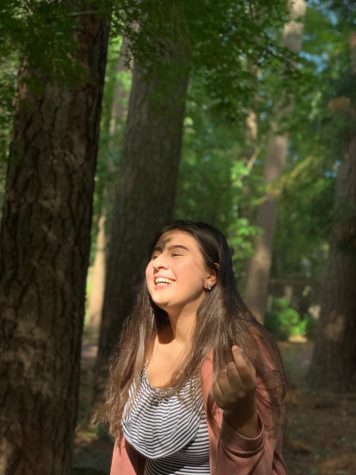Science Honor Society members explore current issues in field of science
Junior Shaun Mathew begins his presentation on top soil erosion on Tues., May 28 in the schola.
June 5, 2019
A new honor society arrived at Ocean Lakes this year, and five Science National Honor society members presented lectures on various topics on Tues., May 28 in the Schola.
Junior Shaun Mathew informed students of the continuous damage of topsoil erosion.
Soil aids in water purification, nutrient recycling, bacterial decomposition and facilitation of the nitrogen cycle. However, due to industrialized agriculture and overgrazing done by farmers, soils can be harmed and led to a variety of issues like deforestation and desertification. Such damage can be prevented by instilling vegetative cover, composting, or man-made netting.
“I believe that as a society, we are exposed to sea level rise and climate change and rightfully so,” said Mathew. “But issues like topsoil erosion have huge impacts on our lives as well. Our soil is so valuable to the global economy for agriculture, yet we neglect to protect it.”
Following Mathew, senior Rachel Pelton spoke of the physics of sailing, who has been sailing and teaching for nine years at the Naval Station’s Sailing Center and Marina in Norfolk. She covered the points of a sail in contact with the wind and certain motions.
“I wanted to spread information about sailing because it is not as simple as it looks,” said Pelton.
Pelton will further her sailing passion at the Coast Guard Academy, venturing into Naval Architecture and Marine Engineering.
“Since I’ve been sailing and been on the water for most of my life, my career will continue that path,” said Pelton.
Senior Colsen Eubank presented fascinating information on the up and coming industry of in vitro meat production.
In recent years, food scientists and companies have explored the possibility of using stem cells from animals in order to produce meats, resulting in killing fewer animals. The process is predicted to reach consumer markets by 2021.
“With the rapidly growing world population, food is a silently brewing problem,” said Eubank. “Cultured meats are a double-edged sword that offers to fight back for us, both increasing the amount of food we produce and limiting the greenhouse gasses created as a result of food production.”
Joshua Faggert discussed another venture at our future’s disposal: black hole exploration.
Earlier this year, the Event Horizon Telescope obtained the first picture of the black hole, roughly 50 million light-years away.
“It not only unveils the ingenuity of current researchers, scientists, and engineers in their ability to pull this feat off, it also displays the sheer intellectual ability of mankind,” said Faggert. “ As Einstein’s theory of general relativity is once again proven to be exquisitely accurate.”
The telescope has locations all over the globe and contains the ability to view two close objects in space as distinctly separate.
“Telescopes provide us with a medium for discovering more about the universe we live in and a process for testing our current theories and hypotheses about the universe,” said Faggert.
The lectures ended on a more emotional note with senior Pinar Caglayan’s discussion on the neuroscience of empathy.
Sympathy is understanding someone’s pain whereas empathy is putting oneself in someone’s shoes and feeling their pain. Caglayan further broke down empathy in terms of how people go through it: mentalizing, experience, and then concern.
“It is important that we learn the potential and limits of our brains so that we can grow to be leaders that are merciful and understanding of one another,” said Caglayan. “That is how we can make a change in our communities and the world.”


